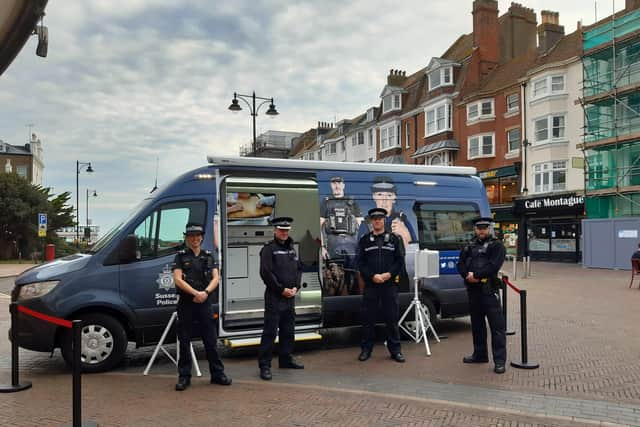Decade of austerity left Sussex’s children open to exploitation, says senior police officer
and live on Freeview channel 276
Chief Inspector Miles Ockwell, District Commander for Worthing, Adur and Horsham, said cuts to public services have left children at the mercy of adults looking to coerce them into criminal activity.
Underfunded schools lack the resources to support troubled children, he said.
Advertisement
Hide AdAdvertisement
Hide AdRather than falling into a supportive net of social services, Ch Insp Ockwell said all too often these vulnerable young people were slipping into more sinister hands.


“Ten years of austerity cuts to youth services have made young people more vulnerable to the people that want to exploit them,” said Ch Insp Ockwell during an engagement event on knife crime in Worthing town centre.
“Safety measures are not there to protect them from that environment and we are reaping the rewards of that.
“I’ve been pushing for additional funding to turn the tide and put in place the systems that stop people being drawn into criminality at an early age and to help bring them back from it.
Advertisement
Hide AdAdvertisement
Hide Ad“We can’t pretend a reduction of support services and school support has not made them more vulnerable to exploitation.”
Children who are at risk of exclusion, or have been permanently excluded, are often sent to alternative provision colleges – centres offering tailored education based on the children’s specific circumstances.
Excluded children are predominantly vulnerable, disadvantaged and/or have special needs, making these centres a fertile hunting ground for predatory criminals.
“We need to get to a point where we are not excluding students,” said Ch Insp Ockwell. “All of the provision that schools used to have has disappeared and they are having to manage challenging young people without the resources.”
Advertisement
Hide AdAdvertisement
Hide AdThe coercion of young people into crime is typified by the rising threat of county lines drug dealing, where gangs from large cities move into smaller areas, exploiting children and vulnerable adults to move their illegal products.
Coastal towns are particularly susceptible to county lines drug dealing, but Sussex already has its own established gangs to deal with on top of the London kingpins.
Increased violence is a hallmark of the rise in these gang’s operations – crimes involving a knife or bladed article more than trebled in the nine years up to September, 2019.
Sussex’s Police and Crime Commissioner Katy Bourne, who is a member of the Conservative party, said more than £2million of investment over the last two years was specifically targeted at tackling youth offending.
Advertisement
Hide AdAdvertisement
Hide AdIn April, 2019, Mrs Bourne secured £890,000 from the Home Office to set up the police-led early intervention scheme REBOOT – a five stage process that works with at-risk children and their families to steer them away from criminality.
Funding of £1.76million has also come from the Home Office over the last two years to form a Violence Reduction Unit (VRU), bringing together Sussex Police, local councils, Public Health England, the NHS and others to tackle and uproot the causes of violent crime.
“Partners within the VRU have adopted a public health approach to addressing serious violence,” said Mrs Bourne.
“This has included embedding tactics such as early interventions to help vulnerable young people, educating them on the consequences of criminality and training staff in schools.
Advertisement
Hide AdAdvertisement
Hide Ad“Some have even reported a 68 per cent reduction in school exclusions as a result of this work.”
The council tax precept and Government investment is also going towards the recruitment of new officers, including the setting up of specific Tactical Enforcement Units aimed at taking on prominent criminals.
A spokesman for West Sussex County Council did not address whether it had adequate resources, but said tackling knife crime was one of the key priorities of the multi-agency Safer West Sussex Partnership, which brings together the police, district and borough councils and other local organisations.
The county council works closely with schools to educate young people about the dangers and consequences of carrying a knife, the spokesman said, but maintained incidents of knife crime in West Sussex schools are ‘thankfully rare’.
Advertisement
Hide AdAdvertisement
Hide AdAccording to Ch Insp Ockwell, it was ultimately the criminals at the top of the tree that were culpable for the spread of violence, drugs and knife crime in the county, and bringing them to justice is central to safeguarding the futures of Sussex’s children.
“The young people involved in knife crime are fundamentally victims of exploitation,” he said.
“The root of that is adults making money out of drugs and we will be coming down just as hard on them.”